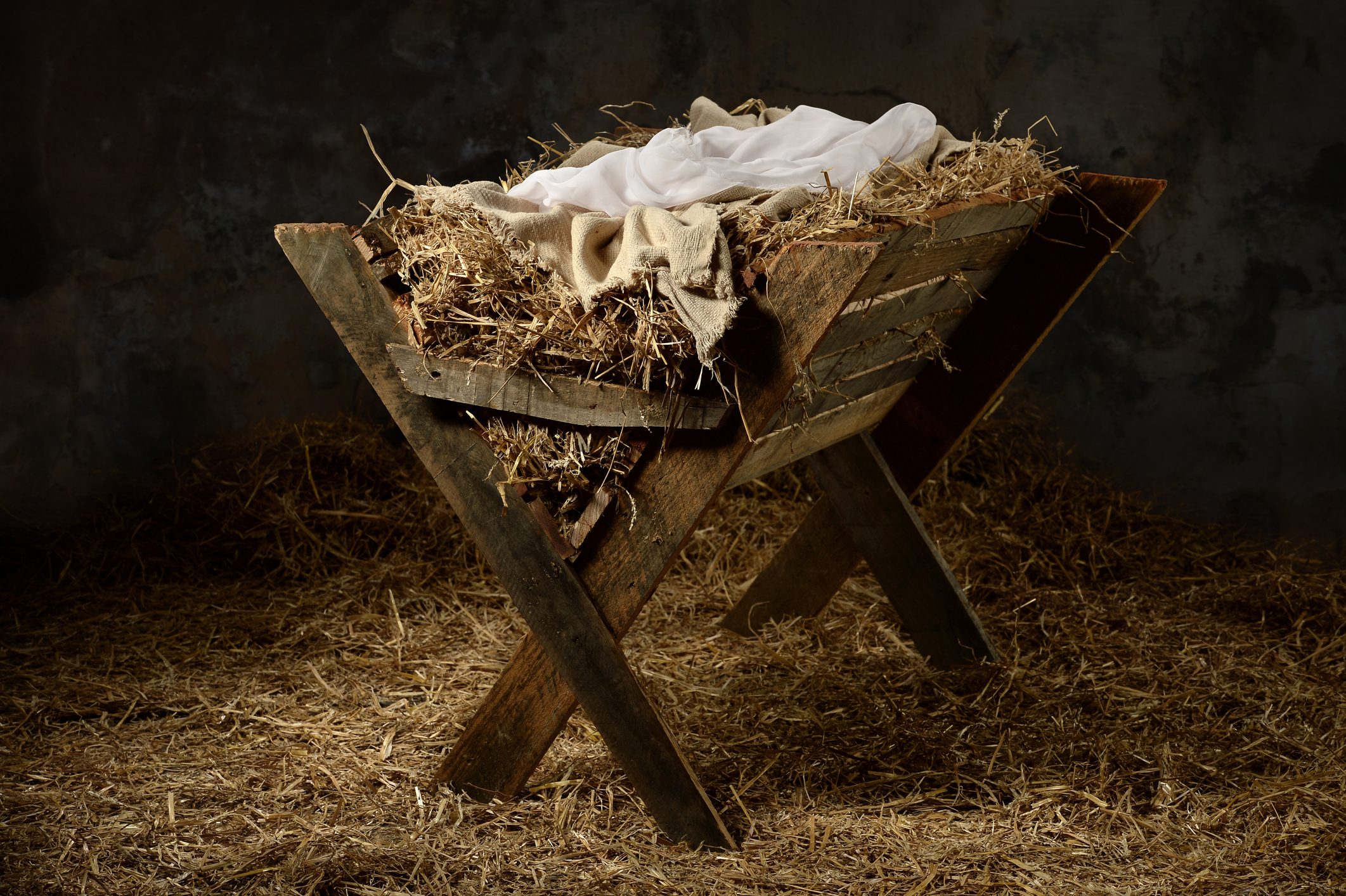
Mary, Are You Ready?

And while they were there, the time came for her baby to be born. Luke 2:6 
Mary is becoming round as can be. Her ankles are swollen, she can’t see her feet beyond the baby bump in front of her. She struggles to stand after sitting for a while. She can’t sleep for all that kicking inside her, the Lord ready to escape the confines of her womb and find out what this earthly world is really all about. And Joseph tells her they have to travel some 90 miles to Bethlehem for a census. “Are you kidding?” she must have asked. “I have to walk or ride a donkey for how long?”
We can’t be exactly sure how long the pair was on the road from Nazareth to Bethlehem, but in Mary’s condition, there was little enjoyment in that trip. Many of us have been exactly where Mary was at that time, ripe with pregnancy, ready to have the pain of birth behind us and to see the face of that tiny child for whom we have waited all those months. And most of us would have been older, more seasoned to the ways of womanhood.
Yet here was Mary, a woman by the standards of her day but a child to our way of thinking, ready to depart with Joseph on a journey that would lead to the greatest story ever told, a birth that would stand above all others as the dividing line in human history. The stage is set. God’s plan for our redemption, a plan that was formulated before time began, has been set in motion. Nothing or no one can stop it.
But there’s even more challenge in His plan than the couple can possibly know. Would they ever have thought that every boarding house in the city would be filled and that not a single innkeeper would try and make room for two more weary travelers, one so heavily burdened that birth was obviously imminent? Who could possibly imagine such a thing happening to the Son of God.
 Therefore the Lord himself will give you a sign: The virgin will conceive and give birth to a son, and we will call him Immanuel. Isaiah 7:14
Therefore the Lord himself will give you a sign: The virgin will conceive and give birth to a son, and we will call him Immanuel. Isaiah 7:14
But that’s the thing…even though the prophets had foretold of a birth that would change the world as they knew it, everyone expected that it would happen with the full honor and dignity afforded a king. A royal birth attended by the best care available at the time. A child clothed in the softest and best fabric in the city. A child admired by all the important people of the day.
No one would have believed that a king would spring from a virgin teen, be wrapped in stable rags, and laid in a feed trough as animals and a surrogate dad stood by.
God really does work in mysterious ways. I wonder what the innkeeper thought when he realized what had happened that night in his stable or if he ever knew. Oh sure, the shepherds were proclaiming all over town that a special baby had been born to save the world, but who believes a band of dirty, raggedy old shepherds. Bystanders likely chalked their claims up to an abundance of wine around the campfire. And angels surely don’t light up the sky to visit shepherds. Or do they?
Jesus didn’t leave His home in the heavens to coddle the wealthy, he came to heal each of us of the ills we try to carry on our own shoulders. He spent most of His time with the poor, the unwashed, the sick. Every one of us is His brother or sister but only a few will acknowledge that relationship and accept the gift He offers. Most of the population was then and is now too busy to even notice.
Was Mary ready for all that lay ahead? Probably not, but she never waivered from her commitment to God. She delivered the hope of the world that improbable night so long ago. In the company of smelly animals and equally smelly shepherds, she birthed, fed, and lovingly wrapped her newborn baby boy who looked just like us, because He was human, just like us. But time would reveal that He was so much more. The journey was just beginning…..
world that improbable night so long ago. In the company of smelly animals and equally smelly shepherds, she birthed, fed, and lovingly wrapped her newborn baby boy who looked just like us, because He was human, just like us. But time would reveal that He was so much more. The journey was just beginning…..
When all the plans were in place and the world was finally ready, the clock struck Christmas, and Jesus was born.
Emily E Ryan, Walking with Jesus Devotions for Advent and Christmas 2024.
Read more...

Mary, What Were You Thinking?

Is life getting a little more hectic than usual around your house? Are you looking for just the right place to set up your tree? Perhaps space or tradition dictates the spot or maybe you appreciate a different look each year. Have you retrieved all the decorations from their eleven-month hiding spots and hung greenery in all the right places? How about the shopping? Are your gifts all hidden away until the big day? Have you finished the wrapping? Do you have a special menu planned and dishes assigned to various family members or friends? Have you baked cookies for everyone at the office? Have the kids made all their wishes known to Santa and had their pictures taken at the mall?
or tradition dictates the spot or maybe you appreciate a different look each year. Have you retrieved all the decorations from their eleven-month hiding spots and hung greenery in all the right places? How about the shopping? Are your gifts all hidden away until the big day? Have you finished the wrapping? Do you have a special menu planned and dishes assigned to various family members or friends? Have you baked cookies for everyone at the office? Have the kids made all their wishes known to Santa and had their pictures taken at the mall?
And can you tell me, please, what does all this have to do with a little baby being born in a stable over two thousand years ago? How have all our traditions associated with this very special holiday celebration become so beautifully wrapped in colorful paper topped with shiny ribbons?
I’m neither a Scrooge nor the Grinch. I love Christmas and all the family time that goes with it…the food, the gifts, the music. It’s a beautiful time of year. However, the older I get, the more aware I become of the disconnect between our time-honored, faith-filled traditions and the picture painted by the secular world we live in. Advent can make a real difference in the way we view Christmas if we approach it wisely and set aside quiet moments to focus on Jesus. It’s important to remember that Christ occupies six of the letter spaces in the name of the holiday we celebrate, CHRIST-mas. That’s two-thirds of the letters. How much time are we devoting to Him as we celebrate? Can we lay aside the hype of the season long enough to examine the message of Christmas?
The white space between Bible verses is fertile soil for questions.
One can hardly read scripture without whispering, “I wonder….”
Max Lucado, He Still Moves Stones

None of us can really imagine the questions and fears that might lay heavy upon our hearts if we were a young teenage girl who just encountered an angel. An angel who brought a message that she would bear a son. She knew it was impossible and yet the angel convinced her that it was true. The Holy Spirit had created a boy child within her, and she was to call him Jesus. She accepted the task set before her because she was a faith-filled girl, but how many questions ran through her mind, the first being how to tell Joseph. He would be so disappointed in her and how could he possibly believe that she hadn’t been with another man? Yet when he was told, he accepted her explanation even before the angel came to him with confirmation of her unbelievable story.
How would her community behave toward her? Would they try to influence Joseph against her? Would they suggest punishments appropriate to the beliefs of the time? Would they shun her? We know that she went to visit her cousin, Elizabeth, but that’s just about all we really know. Surely she went because of family ties and wanting to spend some quality time with this relative who also carried a special child, but could she have wanted to separate herself for a while from the members of her community who might not be kind or understanding toward her? Who are we kidding? Her life could have actually been in danger. Those early months of her pregnancy must have been filled with wonder and awe at having been chosen to carry the Son of God within her but also colored by doubts, questions, and fears about this great mystery and the reactions from those around her.
If you’re a mom, what were your thoughts and concerns about the child you carried? You were likely confident the birth would happen in a sterile hospital environment. Mary was not. And even though she didn’t know God’s plan for her to deliver in a common stable far from home, she likely believed her child would be welcomed into the world among family. You probably spent time shopping or making the necessities for your baby’s first months of life but Mary spent a great deal of her time traveling and fending off verbal abuse and may have, at times, feared for her safety. We’ll never know exactly what Mary experienced. We have only cultural conjecture to guide us.
 I think God intentionally left gaps in all the stories of the Bible because he wanted us to fill them with our own faith-filled concepts. He wanted to offer all His children an opportunity to trust in His good timing for everything in our lives. He wants us to trust in Him but He gave us the opportunity to ask questions, to develop an ongoing dialog with Him. How close do you want Him to be?
I think God intentionally left gaps in all the stories of the Bible because he wanted us to fill them with our own faith-filled concepts. He wanted to offer all His children an opportunity to trust in His good timing for everything in our lives. He wants us to trust in Him but He gave us the opportunity to ask questions, to develop an ongoing dialog with Him. How close do you want Him to be?
The Virgin Birth is much more than a Christmas story; it is a picture of how close Christ will
come to you. The first stop on his itinerary was a womb…..He issues a Mary-level
invitation to all his children. “If you’ll let me, I’ll move in!”
Max Lucado, Next Door Savior
Read more...

Mary, Did You Know?


Gabriel appeared to her and said, “Greetings, favored woman! The Lord is with you!” Luke 1:28
Our family returned to their home, our home is quiet once again. Thanksgiving is in the rearview mirror and it’s time to think about Christmas. It’s been a tradition for many years to transform our home and decorate our tree on Thanksgiving weekend. I get a little slower every year and find myself taking the time to savor all the memories packed into our tree decorations. They represent ornaments gifted to us by loved ones no longer with us, new marriages, births, gifts from friends and family, and wonderful trips we have taken. I love to quietly recall each one and to share the memories with Ken. Sometimes my daughter and granddaughter like to hear the stories too.
I’ve been deeply blessed by the people who’ve shared my day-to-day living and those who’ve touched my life peripherally. I’ve seen things and been to places that many don’t have the opportunity to experience. Oh yes, there are lots of places I haven’t been, but I’ve made a good effort to learn about them and I suppose one would say I’ve lived life rather fully. In living life, I’ve made a multitude of mistakes, some that have affected not only my own world but the worlds of those around me…those who loved me.

So, I ask myself why was I given the gift of words. Why was I chosen to bring the hope and promise of Jesus to others through my writing? I am such an imperfect vessel and I no longer enjoy the freshness of youth. I have no theological training. The most I’ve done is lead a Sunday School class or teach kids at VBS. I’m not equipped to do this task with which I’ve been entrusted. So, why me, Lord? I can come to only one conclusion, God isn’t finished with me yet. I have much to learn and a shorter time in which to learn it. I’ve often said the messages I write are quite often directed straight at me. I can see myself in each one.
“Don’t be afraid, Mary,” the angel told her, “for you have found favor with God! You will conceive and give birth to a son, and you will name him Jesus.” Luke 1:30
As I ponder the reasoning for my being where I am right now, I can’t help but ask myself what was going through Mary’s mind when the angel approached her with the news that she would bear a child. Her first incredulous reaction was, “How can that be? I haven’t been with a man.” Mary’s body was pure, unstained. She was a virgin. She probably made her own share of blunders growing up but she had not been touched by a man. She was betrothed, but she and Joseph had not broken the time-honored traditions of their people. And yet, for a moment, she questioned the credibility of the message this angel had brought. She must have wondered how she would explain this anomaly to Joseph. He would be hurt and perhaps a little angry. Would he leave her to face this pregnancy alone and what would become of her if he did? Where would she go and how would she support herself and her child? And what if she actually was stoned by her own people because they judged her to be immoral? That was a very real possibility in those times. But the angel encouraged her and promised that the Holy Spirit would be with her.

In her heart, she knew that she must accept this circumstance the Lord had placed upon her. And she did so willingly. I can’t imagine that there wouldn’t still be questions regarding all the details and logistics of the coming months of her life, but Mary accepted her role whatever that might entail and she grew in faith.
I am the Lord’s servant. May everything you have said about me come true.” Luke 1:38
This is the season of Advent, a time of wonder and anticipation, a time to ponder the miracle and mystery of Christ’s birth.
Daily Guideposts: 25 Devotions for Advent
Read more...

A Season of Thankfulness

In the name of our Lord Jesus Christ, always give thanks for everything to God the Father. Ephesians 5:20
Ah…I can smell it now. The scents of a roasting bird filled with pungent stuffing, mingling with the spicy cinnamon and nutmeg in sweet potatoes and pumpkin pie. Thanksgiving must be very near. Most of our days are filled with fast food, quick suppers thrown together from whatever is waiting in the frig, but on Thanksgiving, we pull out all the stops. We shift into the traditional mode, searching for Grandma’s unbeatable stuffing recipe and Aunt Rose’s to-die-for pumpkin pie. The kitchen becomes a beehive of activity and, as company arrives, they all migrate to the place where Thanksgiving dinner begins.
Soon everyone is taking a walk down memory lane, visiting Thanksgivings past and reliving stories of youth and adventure. And, if your family is anything like ours, the stories get bigger and bigger in the annual retelling. We love to gather with those we love, share the happenings in our lives since we gathered last, and stuff ourselves on forbidden food with a promise to get right back on that diet as soon as Monday rolls around.
The food is delicious, the stories are fun, and the football games; playing in the backyard variety or watching our favorite teams battle it out on TV, all combine to make it a very festive day…..but there’s more to Thanksgiving than all of that. As I reflect on all that God has done for me and for my family this past year, I realize just how blessed we are to have him right here in our everyday lives.
 Holidays can be some of the most beautiful times of our year, yet it doesn’t turn out that way for everyone. So as we gather to give thanks to God for his blessings in our lives, perhaps we know someone who may be alone and hurting, someone who’s a stranger in town or just living alone with no family nearby? Why not ask them to join us? Embrace them into our family and make them feel welcome. It’s what Jesus would do. In fact, he embraced anyone at any time, no matter how busy he might have been or how far behind in his journeys. He always had time to stop and talk for a while and maybe offer a hug of friendship. And he didn’t surround himself with royalty or affluent dignitaries. He dwelt among the common people of his day. He was one of them.
Holidays can be some of the most beautiful times of our year, yet it doesn’t turn out that way for everyone. So as we gather to give thanks to God for his blessings in our lives, perhaps we know someone who may be alone and hurting, someone who’s a stranger in town or just living alone with no family nearby? Why not ask them to join us? Embrace them into our family and make them feel welcome. It’s what Jesus would do. In fact, he embraced anyone at any time, no matter how busy he might have been or how far behind in his journeys. He always had time to stop and talk for a while and maybe offer a hug of friendship. And he didn’t surround himself with royalty or affluent dignitaries. He dwelt among the common people of his day. He was one of them.
As we move from the feast of Thanksgiving into the mystery of Advent, we turn our thoughts to the story of a miracle, one in which a young girl is touched by God himself and chosen to carry a very special child, though she remains a virgin. Over these next few weeks, we’ll experience the drama and significance of the story that unfolds on the stage of Bethlehem.

The angel came to her and said, “Peace be with you! The Lord is with you and has greatly blessed you!” Mary was deeply troubled by the angel’s message, and she wondered what his words meant. The angel said to her, “Don’t be afraid, Mary; God has been gracious to you. You will become pregnant and give birth to a son, and you will name him Jesus. Luke 1:28-31
Are you ready to open your heart to the story that begins in a manger stall and finds its ending on a roughly hewn cross? But, of course, it doesn’t end! What seems to be the end is just the beginning. It’s quite a tale. Are you ready to meet your Lord and Savior in a stable outside of Bethlehem?
Thanks be to God for his inexpressible gift! II Corinthians 9:15
Read more...

Worship Is….

When we worship….we place God on His throne. (Paraphrased)
 For a great part of my life the word “worship” meant the aggregate of many components that when combined created a church service, aggregate meaning a whole formed by combining several elements. Church was a worship service combining prayer, music, and a spiritual message. I attended regularly each Sunday morning and evening while growing up and was also there on Wednesday evenings. As I look back, I wonder just how “present” I really was. Oh, I was definitely invested in the special programs and cantatas that surrounded the holidays. I put in the required study time to be baptized and accepted into membership and, yes, many of the scriptures that I memorized are still lying deep in the hollows of my brain. I recognize them when they are read or spoken but I am not always consciously aware of them.
For a great part of my life the word “worship” meant the aggregate of many components that when combined created a church service, aggregate meaning a whole formed by combining several elements. Church was a worship service combining prayer, music, and a spiritual message. I attended regularly each Sunday morning and evening while growing up and was also there on Wednesday evenings. As I look back, I wonder just how “present” I really was. Oh, I was definitely invested in the special programs and cantatas that surrounded the holidays. I put in the required study time to be baptized and accepted into membership and, yes, many of the scriptures that I memorized are still lying deep in the hollows of my brain. I recognize them when they are read or spoken but I am not always consciously aware of them.
So when did the word “worship” begin to creep into my soul and why have I recently become conflicted about its true meaning?
The dictionary identifies worship as “the feeling or expression of reverence or adoration for a deity.” That’s pretty straightforward. We feel reverence for a deity and express that reverence through our words and actions.
Worship is the “thank you” that refuses to be silenced.
In recent years, we have come to identify the musical portions of our church services as worship or praise and worship. But don’t we also show our reverence through prayer and study of His Word? The thing is….I don’t see worship as just a Sunday thing. I believe that every word or action expressed throughout each and every day is worship if it honors our God.
Worship is when you’re aware that what you’ve been given is far greater than what you can give.
When I wake to a brilliant sunrise or witness an evening panorama of blazing colors, I know that they are gifts from my Creator and that is worship. When I coax a tiny new seedling through the crust of earth, my smile is worship to the one I walk with every day. When I wander beside a meandering stream, witness the power of an ocean wave, when I stand atop a mountain where I can see for miles or am enveloped in a valley rich with foliage and teeming with wildlife, my heart is thankful to be alive and that is worship because God made it all.
 Many years ago, on the day Ken and I said our marriage vows before God and all our witnesses, my heart thanked God for this perfect life partner he had brought into my life and that was certainly worship. When over the years I’ve looked into the eyes of my newborn children and grandchildren and I know beyond a shadow of a doubt that they are the greatest gifts our God can give to us, my eyes filled with mist and that also was worship.
Many years ago, on the day Ken and I said our marriage vows before God and all our witnesses, my heart thanked God for this perfect life partner he had brought into my life and that was certainly worship. When over the years I’ve looked into the eyes of my newborn children and grandchildren and I know beyond a shadow of a doubt that they are the greatest gifts our God can give to us, my eyes filled with mist and that also was worship.
Worship is a voluntary act of gratitude offered by the saved to the Savior, by the healed to the Healer, and by the delivered to the Deliverer.
Being thankful every day for the breath of life, for family and friends, for the biggest of celebrations to the smallest of everyday blessings, that is worship, and our God smiles at every moment of gratitude that we return to Him. So let’s all get busy and WORSHIP!
All quotes are from The Eye of the Storm and Unshakeable Hope by Max Lucado
Read more...

Navigating a Minefield and Discovering Treasure

And walk in love, as Christ loved us and gave himself up for us, a fragrant offering and sacrifice to God. Ephesians 5:2
Last week began with an unexpected mad rush to the emergency room. Ken was experiencing acute chest pain and our emotions were running extremely high. A barrage of assorted tests, enough blood drawn to drain a body, and all the fears associated with this kind of trauma hovered over our days. He was diagnosed with a pulmonary embolism and every effort was expended to locate the cause. After five days, he was home again, now taking blood thinners and there’s still no definitive answer as to the cause. But he’s home, and that’s what counts.
Amidst all the chaos, family and friends have offered prayers, concern, and support. To all, we say a genuine, heartfelt “THANK YOU!” You are truly the angels in our lives.
By this all people will know that you are my disciples, if you have love for one another. John 13:35
And from the chaos, I take several memories that capture the goodness in humankind. The first are all the nurses who truly are angels and serve in ways I can’t imagine. Their dedication to their profession is a beautiful thing to witness. Their patience with their patients goes beyond anything that I could ever muster. No matter how nasty a patient’s attitude, he or she is met with kindness, with sweet and comforting words that turn away the frustrations of the moment. When they must wake a patient in the middle of the night to take vitals, they know the right things to say and do to take the sting from the patient’s reluctance at being awakened once again. We can’t say enough to appreciate all they did to make Ken’s hospital stay more bearable.
 And then some volunteers made my husband smile during a very difficult day. On our arrival in the ER, Ken looked up from his gurney and said to me: “This is why people vote early.” We had chosen to vote at our local polling place on election day. Ken never misses an opportunity to vote. After serving eight years in the military to preserve that privilege, he takes it very seriously. When our daughter learned that he was distressed over not having voted, she immediately got on the phone to the Christian County Courthouse to see if anything could be done. They took all his information and said they would put forth their best effort to get someone there, but they couldn’t promise that a team would be available. It was then that I discovered I had left Ken’s wallet, including ID, at home that morning. So our daughter hopped in the car and drove right back down the road we had just traveled to retrieve his ID, just in case. And, sure enough, at about three o’clock on election day afternoon, in walked two total strangers with a ballot. Ken’s face lit up like a Christmas tree. He voted and that made his day. Four people at Mercy Hospital were able to vote that day because of volunteers. If you ever are looking for a place to volunteer your time, I can tell you this is a very worthy one.
And then some volunteers made my husband smile during a very difficult day. On our arrival in the ER, Ken looked up from his gurney and said to me: “This is why people vote early.” We had chosen to vote at our local polling place on election day. Ken never misses an opportunity to vote. After serving eight years in the military to preserve that privilege, he takes it very seriously. When our daughter learned that he was distressed over not having voted, she immediately got on the phone to the Christian County Courthouse to see if anything could be done. They took all his information and said they would put forth their best effort to get someone there, but they couldn’t promise that a team would be available. It was then that I discovered I had left Ken’s wallet, including ID, at home that morning. So our daughter hopped in the car and drove right back down the road we had just traveled to retrieve his ID, just in case. And, sure enough, at about three o’clock on election day afternoon, in walked two total strangers with a ballot. Ken’s face lit up like a Christmas tree. He voted and that made his day. Four people at Mercy Hospital were able to vote that day because of volunteers. If you ever are looking for a place to volunteer your time, I can tell you this is a very worthy one.
And then there was his roomy. We had all enjoyed the private room he was in when acute care was needed, so when they announced on the second afternoon that he would be moving, we were grateful that acute care was no longer needed but also reluctant to give up the privacy of the room. The move could not be accomplished until very late in the evening and I had gone home by then. He called the next morning, distraught because the roommate had caused constant disruption all during the night. When I arrived, he was still distraught, but settled a bit when I talked to personnel and they agreed to somehow solve the problem. For a time I must admit that my anguish over Ken’s anguish caused me not to focus on the needs of the other man. We didn’t exemplify the mission of our church to be Christ in the world. Little did we realize that this was our opportunity to reach out to someone we didn’t know who was really hurting in ways we didn’t understand. 
Over the next two days and after he had a long sleep, during which we all had time to recuperate, we began to see signs of goodness within the man amidst all his swearing and inappropriate behavior. Each time he flung a bad word across the room, our daughter prayed that the peace of Jesus would enter his soul. I began to pray for his overall welfare. And Ken gave him a buckeye. In case you didn’t know, the buckeye is a symbol of good luck, and these came from a churchyard where Ken and the pastor prayed over the ones they gathered, making them special. I hope that buckeye helps this man to remember that God loves him. On their last night sharing a room, the two men watched post-election stories and shared comments about their thoughts. The roommate left about an hour before Ken, but he wasn’t going home, he was being moved to a long-term facility. He’s been added to our prayer list and I’d appreciate your adding him to yours. I won’t share a name, just that we all ask for the peace of Jesus to reach into his heart. We all need the gift of His peace.
We love because he first loved us. I John 4:19
Thank you, Jesus, for your constant presence at our sides.
Read more...

When Temptation Comes Calling


The temptations in your life are no different from what others experience. And God is faithful. He will not allow the temptation to be more than you can stand. When you are tempted he will show you a way out so that you can endure. I Corinthians 10:13
There’s an App for absolutely everything today! And there is email and text messaging and social media…the time-tested TV ad… all proven ways to share great ideas about how we should spend our hard-earned cash.
- There’s the three-day sale with a count-down clock (which typically is extended just before expiration).
- Coupons that offer a percentage off your bill but only after you spend X amount of dollars and do it within a future window of short duration.
- Everyone has a rewards program….spend more, earn more.
- Then there are shopping channels, a salesperson right in your own living room tempting you with gadgets that will make your life easier.
- The never-ending ads promise rapid weight loss, cures for anything that ails you, cars you can’t afford, and home décor suggestions that will break most personal banks.
- Constant notifications that time is running out on this very special offer.
- Even snail mail is fair game to initiate trade-in offers for everything from tech devices to cars.
 ALL FEEDING OUR NEED TO SHOP and, lest we forget, all these things will rot and decay over time unless they become outdated first! What we once thought was treasure will become trash.
ALL FEEDING OUR NEED TO SHOP and, lest we forget, all these things will rot and decay over time unless they become outdated first! What we once thought was treasure will become trash.
Our culture is focused on ‘net worth.’ We’re always afraid of running out….remember the immediate depletion of toilet tissue when the COVID pandemic was declared? We panic when our physical and emotional security are threatened, so we buy more than we need. As a result, we fill our garages with stuff, forcing our expensive cars into the driveway, and when there is no room left to store our stuff in the garage, we rent a storage unit. I know these storage solutions can be helpful in certain temporary situations, but when our “stuff” has been stored away for years and we haven’t even looked at it, why do we need it? Maybe it’s time to reclaim the garage or find a better use for all the stuff in the storage unit. We, as a society, are in need of epic-level decluttering. Someone else may be able to use the treasures we once thought so important.
And in order to finance our shopping needs, we are so busy making more money to buy more things that we forget: “We’re rivers. Not reservoirs.” (Bob Goff) We are made to give and not retain.

Whatever you have to give, do it lavishly. The amount doesn’t matter to God, but the heart does.
Bob Goff, Live In Grace, Walk In Love
Our personal treasures may tumble but Jesus offers eternal rewards! When temptation comes calling, remember who you are, and know who really has your back when life gets stormy. The biggest house on the block and the fanciest car in the garage (or the driveway) won’t help when you really need a friend you can trust. But Jesus will!
Give, and you will receive. Your gift will return to you in full—pressed down, shaken together to make room for more, running over, and poured into your lap. The amount you give will determine the amount you get back. Luke 6:38
Read more...
Cleaning Up My Mess
For everything there is a season, a time for every activity under heaven. Ecclesiastes 3:1
Okay, it was time….or maybe past time, to grab my pruners, my garden gloves and some trash bags. I dread removing the faded debris from my precious perennials when their season is finished. It seems so final. And this season has been a roller coaster for perennials, actually for my annuals as well. Our last frost in the spring occurred pretty early and, being a lover of bright garden color, I picked up a few long blooming annuals to jump-start the color palette and fill in spaces between perennials. After crawling on my hands and knees to get them into the ground, I stood back to admire my handiwork and was very pleased with the view from our street.
It seemed, however, that the critters in our neighborhood had a different take on my additions. What had been healthy, vibrant hibiscus and lantanas covered in beautiful blooms when I went to bed looked like a desert wasteland the next morning. An ever-growing family of bunnies had nipped off every single bloom and some of the leaves. And to add insult to injury, the squirrels had turned all that disturbed ground and new topsoil into something that resembled a war zone. The only things remaining were a few spindly stems that bore irregular leaves. I replanted them in pots, hoping that would place them out of bunny reach and it did, but the squirrels continued to dig until I placed rocks on the soil and sprinkled in a liberal amount of cayenne pepper. Finally, they became less aggressive in their digging. Those particular lantana never reached their potential but the hibiscus are still bringing smiles to my face with their huge red flowers, and it’s almost November.
The growing season has been a roller coaster, too much rain then not enough and our recent drought has brought many of the perennials to their knees. Most of them have a nature-prescribed season to grow vigorously and create beautiful blooms that mature into seeds, and then many die back until the next season. A few, however, stay with me for the summer if I coddle them a bit and deadhead their blooms regularly to keep them from going to seed. But all the water that I gave them this year couldn’t make up for the lack of late-season rain. It was time to remove the mess left behind and take down a few that were trying to keep going but just requiring too much hand watering to be considered reasonable. I had to let them go for their ultimate health as well as that of my water bill. Forcing them to go on when they were well past their normal growing season could result in weaker plants for next year.
 Pruning and removing dead wood is an extremely important aspect of gardening. Halfway through the summer, I give my impatiens a major haircut. They look pretty rough for a couple of weeks but they come back much stronger and last until the frost finally claims them. We are nearing November and my pots are providing good color.
Pruning and removing dead wood is an extremely important aspect of gardening. Halfway through the summer, I give my impatiens a major haircut. They look pretty rough for a couple of weeks but they come back much stronger and last until the frost finally claims them. We are nearing November and my pots are providing good color.
Timing is also very important to the pruning process. Many perennials bloom on old wood and need to be pruned immediately after they bloom to ensure new growth that will then become the old wood for the following spring. Sometimes we prune to remove a diseased portion of the plant or tree and sometimes when two branches rub together causing raw, open wounds on both of them. Whenever pruning occurs and for whatever reason, if done properly, it assures that the plant will be healthier and provide many years of beauty in the garden.
I am the true grapevine, and my Father is the gardener. He cuts off every branch of mine that doesn’t produce fruit, and he prunes the branches that do bear fruit so they will produce even more. John 15:1-2

And how, I ask, could all this pruning of trees and plants be any different from the pruning in our lives? Does God not work daily to remove the bad things from our lives, to strengthen us by challenging who we are in Him?
The Lord corrects those he loves, just as a father corrects a child in whom he delights. Proverbs 3:12
Read more...

A Perfect Audience of One

Truly, I am writing for an audience of One, but I pray He will put my work into the hands of those who need it.
From the website of Jennifer Sienes, Christian author 
A few Sundays ago, I ran into a friend between services, and after catching up on news of our families, he went on to comment on the most recent Gatepost Weekly and how my article had affected him. Another man walked up to us, and my friend introduced me as the one who writes articles for the weekly missive. There was no hint of recognition. I must have been basking in a moment of pride when humility smacked me hard, and I was forced to recall that I don’t write for accolades. That doesn’t mean that I don’t enjoy hearing from you…I do. I just need to remember not to let pride get in the way of my relationship with Jesus. There is a purpose behind the words I’m gifted with, and while my work is anything but perfect, if it helps someone to see Jesus in a different way than before, my goal has been accomplished, my gift well used.
In a good week, the Lord offers me a thread to tug, and my task is to stretch that thread and weave it together with others to enhance a point that needs to be made to someone. Often, it is aimed straight at me. I pray that my sharing can reach another who needs to hear the message.
The challenge happens when I become distracted and miss a message, a Spirit nudge, the days I lock myself in my own little world. Today is one of those days. I find my thoughts wandering and am beginning to feel that my well is running dry. I’m sure you have those days too, when everything seems upside down and inside out, when you wonder if the world will ever stop hurling troubles your way. Those are the days when I know I need to reach down deep inside myself and pull out the very best of me, knowing that my best is nothing compared to what lies within the beating heart of my Jesus. And when I reach out to Him, He hears my plea for help, and a tiny seed will be planted in my heart and begin to grow, its roots will deepen and its branches will reach out.
Your heart is a fertile greenhouse ready to produce good fruit. Your mind is the doorway to your heart—the strategic place where you determine which seeds are sown and which seeds are discarded. The Holy Spirit is ready to help you manage and filter the thoughts that try to enter.
Max Lucado, Just like Jesus
 When I feel there is nothing left in me, He fills my well again with thoughts and words, messages that I need to hear in my quest to be more like Him. I need that precious connection and so do you. And with that connection, reality settles in….I don’t use my gift of words to gain glory on this earth. The words He gives to me flow back to Him, my perfect audience of One, and if they also land in someone’s world who needs to hear them, that’s a bonus.
When I feel there is nothing left in me, He fills my well again with thoughts and words, messages that I need to hear in my quest to be more like Him. I need that precious connection and so do you. And with that connection, reality settles in….I don’t use my gift of words to gain glory on this earth. The words He gives to me flow back to Him, my perfect audience of One, and if they also land in someone’s world who needs to hear them, that’s a bonus.
We all have spiritual gifts and we’re expected to share them freely. If you haven’t discovered yours yet, open your heart wide, invite Jesus in and give Him room to scatter a few seeds. You may be very surprised at what will grow.
Put on your new nature, and be renewed as you learn to know your Creator and become like him. Colossians 3:10
Read more...

